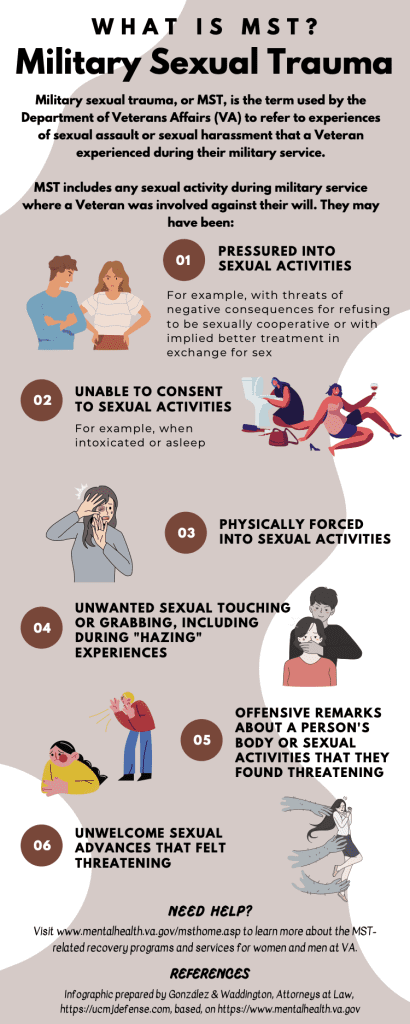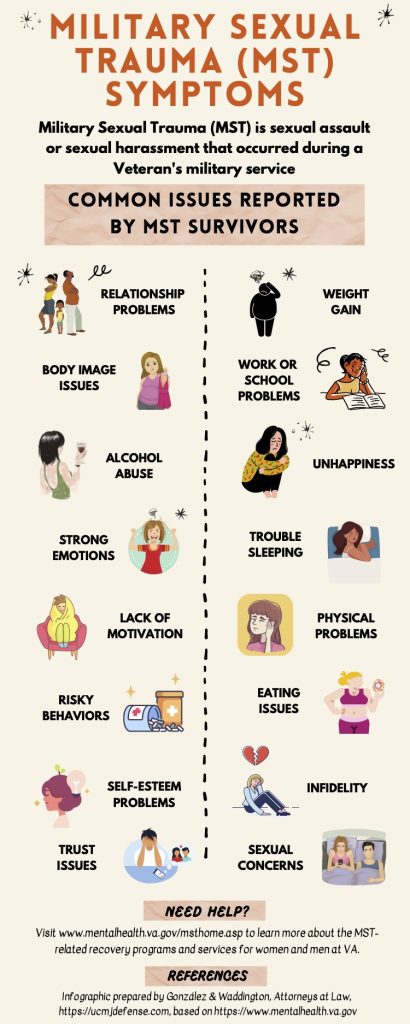Video on BPD False Accusations in Military Sexual Assault Cases
Call us today to get more information on Military Administrative Discharge Lawyers
Falsely accused of military sexual assault by someone with Borderline Personality Disorder?
If you are falsely accused of military sexual assault by a person that suffers from Borderline Personality Disorder (BPD), call our military defense lawyers today.
What is Borderline Personality Disorder (BPD)?
Symptoms of Borderline Personality Disorder
Borderline personality disorder is a complex mental illness characterized by unstable relationships, heightened sensitivity to abandonment and rejection, reckless behaviors that can be self-destructive, including drug use or overeating. Individuals with borderline personality disorders have trouble managing their emotions which are often intense and erratic. Borderlines also struggle when it comes to maintaining stable interpersonal relationships because they experience fear of abandonment and extreme reactions if the relationship ends. What’s more? They frequently engage in impulsive behavior such as risky sex or substance abuse whenever feeling threatened.
This chart shows the alleged symptoms of Military Sexual Trauma
These vague symptoms below of Military Sexual Trauma (MST), as defined by the Department of Veterans Affairs, describe many of the same characteristics as those suffering from Borderline Personality Disorder (BPD) and Histrionic Personality Disorder (HPD). As such, it is easy for a fake victim with BPD or HPD to qualify for VA Disability and early medical retirement for preexisting mental health conditions. All they need to do is add in an unwanted sexual advance, sexual harassment, sexual assault, a butt grab, drunk sex, or sexual comments, and they will likely get a lifetime of free benefits.
Click here to download an infographic on Military Sexual Trauma MST Symptoms VA Disability Rating
Symptoms of borderline personality disorder can be hard to detect and differentiate from other diseases. Still, there are nine specific symptoms that you may find helpful in identifying this mental illness. The first symptom of Borderline Personality Disorder is fear of abandonment.
This leads to the need for constant reassurance that you’re not about to be abandoned, causes you to go to extreme lengths to avoid feeling abandoned, and if the relationship ends, it devastates your self-esteem due to an unstable or chaotic relationship because they have a tendency towards unhealthy relationships which means any stability within their life could easily crumble at any moment without warning, so when faced with these feelings they run from them by creating more chaos until it completely consumes them like fire beneath their feet just waiting for someone else’s hand
BPD Characteristic 1: Fear of Abandonment
Experts in psychology believe that the fear of abandonment comes from childhood trauma or loss. This means, if you have a history of any kind of abuse and neglect during your formative years, then it is likely that this contributed to why you developed such an intense fear of being abandoned by those who are important to you now.
This can manifest itself as compulsive behaviors:
- Stalking exes on social media
- Stalking family members and friends of exes on social media
- Driving out close friends
- Attacking their loved ones
- Leaving and then returning to loved ones
- Breaking off a relationship in a dramatic fashion
- Stalking former lovers or friends
When Borderline Personality Disorder patients exhibit signs related to their obsession over not wanting someone else to leave them alone again after making significant sacrifices for said person
Intense people often have difficulty in relationships. They attach quickly, which can make them insecure and jealous of the people they meet. Intense individuals find it hard to trust new partners or commit long-term, so they might move on before getting too attached.
BPD Characteristic 2: Unstable Relationships
Those with borderline personality disorder often embrace a situation or person, but soon after, this idealization ends. A good example of an instance that would cause the switch from thinking there’s nothing bad about someone to believing they are terrible is when something goes against what was originally seen as perfect in their eyes. It triggers them back into another level of obsession where everything becomes ugly again. Sometimes people can overreact so strongly to any imagined rejection or abandonment that anything deemed less than perfection causes these extreme reactions. Once one has been rejected by someone who seemed infallible, then no future potential partners seem possible.

In response to being devalued, a person with Borderline Personality Disorder (BPD) might quit the related task and become aggressive or even just give up. Sometimes their negative view stays constant, and it does irreversible damage; other times, they will see that same task as valuable again.
The consequences of unstable relationships can be severe: jobs lost, classes dropped out of school for lack of funds, friendships destroyed due to arguments over misunderstandings in communication styles—even interpersonal relationships ending when one partner feels like he/she is not good enough because there’s always someone better than them around waiting in the wings.
BPD Characteristic 3: Shifting & Unclear Self-Image & Overly Sexual & Flirtatious
People with borderline personality disorder can struggle to form and maintain personal relationships, as well as a stable sense of self. They may change their behaviors dramatically depending on their situation, feeling unsure about who or what they believe in at times. People with Borderline Personality Disorder (BPD) might ask questions like “Who am I?” or “What do I stand for?”
The same instability those with Borderline Personality Disorder (BPD) have in relationships can also impact the way they see themselves. Someone with a borderline personality disorder might believe he’s successful one moment but think of himself as a failure another time. He may behave differently depending on his mood or situation because his self-image is unstable, and uncertain about his identity and what defines him. The person will sometimes ask, “Who am I?” or “What do I stand for?” even wondering where does their place lies in this world.” Identity issues are core struggle people living with Borderline Personality Disorder (BPD) face every day
When it comes to identity, many people experience some level of disturbance. This is characterized as an unstable self-image or sense of self that persists for a long time without change which can be mentally and emotionally exhausting.
BPD Characteristic 4: Self-Harm
Self-harm and suicidal behavior are common borderline personality disorder symptoms.
Suicidal behavior includes:
- Carrying out suicide attempts.
- Thinking about suicide.
- Threatening to commit double suicides with others.
- Committing a homicide/suicide pact.
In contrast, the other person acts as an accomplice by providing helping information like access to tools that can be used in a successful act of lethal self-injury. It also involves deep feelings of loathing for oneself. This manifests itself through thoughts on death and preoccupation involving topics such as weapons intended for suicide.
Self-harm and suicide attempts are so common among those with Borderline Personality Disorder (BPD) that it’s the only mental illness where these behaviors make up its diagnostic criteria. Almost 80% of people with Borderline Personality Disorder (BPD) have reported a history of suicide attempts, and death from suicidal behavior is 8 to 10 times higher than in the general population – 50 times more likely.
Self-harm is a way for people to express themselves, be accepted by others without judgment, and cope with tough life circumstances.
It’s categorized into various types of self-harm:
- Self-cutting
- Self-burning
- Hitting oneself
- Banging one’s head against hard objects like walls to injure the body parts.
- Hair pulling includes yanking on hair strands until they break off from their follicle roots, causing patches of baldness.
BPD Characteristic 5: Self-Destructive and Impulsive Behaviors
Many people with Borderline Personality Disorder (BPD) don’t realize they have this disorder and may not be aware that it’s causing their feelings. Unfortunately, one major symptom is self-harm behaviors which can cause a whole host of other problems in your life, including financial or legal troubles and destroying relationships. Impulsivity might seem like just the occasional fight, but if left unchecked could lead to serious consequences for you both internally and externally, creating more harm than good.
People with Borderline Personality Disorder are a group of people that can be tricky to understand because they do not all have the same symptoms. Some experience impulsive behaviors such as jumping from job to job, while others feel suicidal or go on spending sprees and find themselves in legal trouble. While these actions may seem harmless at first glance, they cause harm both internally (i.e., self-harm) and externally (relational damage). For those who want some more information about this disorder before deciding if it is right for them, an article entitled “5 Facts You May Not Know About Borderline Personality Disorder (BPD).”
Over three-quarters of people with borderline personality disorders engage in one form of self-harming behavior during their lives; impulsivity.
One of the most important and distinctive features of borderline personality disorder is impulsive behaviors.
These are generally defined as actions without foresight that are poorly conceived, prematurely expressed, unnecessarily risky to oneself or others around them, and inappropriate for the situation at hand. Those with Borderline Personality Disorder (BPD) may carry out harmful or sensation-seeking acts when angry or otherwise upset such as:
- Compulsive lying
- Binge eating
- Driving excessively fast even though they know it’s dangerous
- Engaging in reckless sexual behavior despite knowing their partner has HIV/AIDS because they just can’t resist temptation
- Buying things on credit only to find themselves unable to keep up payments later down the road (shopping sprees);
- Binge drinking
- Having random sex with strangers
Borderline Personality Disorder is a mental illness in the DSM-5. People with borderline personality disorder may carry out harmful or sensation-seeking actions, like binge eating and driving fast when angry or upset.
Those with Borderline Personality Disorder (BPD) may carry out harmful or sensation-seeking actions, particularly when angry. For example, they might drive fast and engage in risky sexual behaviors, but they are always seeking some form of relief from their chronic emotional pain no matter what it takes to achieve that end.
BPD Characteristic 6: Extreme Emotional Swings
Those with borderline personality disorder are the people who never know what they will feel like from one day to another. They can go from feeling ecstatic and then fall into an abyss of rage in just a few seconds. The roller-coaster effect is much worse for them than it would be for you or me because we have enough sense not to hurt ourselves when our emotions swing out of control – but those suffering from Borderline Personality Disorder (BPD) usually do something self-destructive as soon as their mood swings happen without any warning at all!
Some people with Borderline Personality Disorder (BPD) turn to self-harm, drug or alcohol abuse, or suicidal behaviors to make themselves feel better.
A Relationship with a Borderline Personality Disorder person is like a Roller Coaster
BPD Characteristic 7: Chronic Feelings of Emptiness
Research has shown that emptiness is a common symptom for people with borderline personality disorder and may also be linked to suicide. This feeling can occur when patients are depressed, which begs whether or not it’s an aspect of Borderline Personality Disorder (BPD) itself- something everyone experiences during their life? An overwhelming feeling of emptiness is a symptom for many psychiatric patients. However, 71-73% of people with borderline personality disorder are also chronically empty, which can lead to depression or suicide attempts.
BPD Characteristic 8: Feeling Out of Touch With Reality or Suspicious Thoughts
A person with Borderline Personality Disorder (BPD) can experience paranoia, a feeling of being persecuted, and out-of-touch. They may also suffer from delusions or hallucinations, as other symptoms come along with the disorder.
Many people who have borderline personality disorders will feel like they’re under attack by others in their lives. This type of relentless persecution is called paranoid ideation, which should not be confused with any belief about what will happen due to the lack of this specific diagnosis.
People with Borderline Personality Disorder (BPD) often suffer from paranoia or feelings of being persecuted and out of touch. This is because they have an increased tendency to misinterpret other people’s behaviors negatively. There are also times when this person will be seen as overly suspicious about what others might do, which can lead them to withdraw socially for fear that everyone around them may mean harm to him. Other symptoms include panic attacks, rage reactions toward friends/family members on small provocations like changes in plans, erratic financial management practices (splurges followed by periods of extreme saving), suicidal thoughts without intent.
Researchers can finally describe the experiences that accompany dissociation: depersonalization, derealization, amnesia, identity confusion, and alteration.
False Allegations of Sexual Assault in the Military – Why Are They Common?
BPD Characteristic 9: Explosive Anger
The symptoms of borderline personality disorder are often more disturbing than the condition itself. One such symptom is intense anger, referred to as “borderline rage.” It isn’t much understood why people with Borderline Personality Disorder (BPD) experience this differently from others or how it’s different. Whatever it might be like for you – feeling too mad to control your emotions and seeing red when someone does something wrong- we can always empathize (if not relate!).
Every day, people with borderline personality disorder (Borderline Personality Disorder (BPD)) have to navigate their way through a world wrought with uncertainty. It’s difficult for them to understand the subtleties of human behavior and perceive things in shades of gray because they view all occurrences as either good or bad. This often leads these individuals into what we call “the vicious cycle,” where anger builds up quickly then eventually explodes outwards towards others when it reaches its peak point – usually after prolonged periods of rumination.
Military Sexual Assault Defenses: Mistake of Fact
Suffering from a borderline personality disorder can make a person experience intense anger in response to an event. This often leads them into ruminating about it, which increases their intensity of anger. Eventually, when the duration and severity of this prolonged rage become too much for anyone with Borderline Personality Disorder (BPD), they will lash out furiously at others because they are not able to release or express themselves any other way without feeling guilty afterward for lashing out aggressively at those who did nothing wrong but just happened to be there while angry.
People suffering from Borderline Personality Disorder (BPD) see things two-dimensionally as most do. Instead, everything is either good or bad depending on how he/she feels that day, even if someone has done nothing wrong towards him/herself yet still gets attacked.
People with borderline personality disorder often see things in black and white, where everything is either good or bad. These ever-shifting feelings are called splitting, which can frequently happen against someone previously considered a friend. One day the person may be deemed as any number of labels like “friend,” but then just days later, they might be a “traitor” or even an outright enemy too.
As a result, borderline Personality Disorder has been looked at for decades as being hard to treat. However, newer treatments have evolved that will help those who suffer from Borderline Personality Disorder (BPD) learn how to express themselves effectively while getting along well with others–concepts such as acceptance and mindfulness play key roles here through therapy specifically tailored for individuals diagnosed with this condition.
Criminal defense lawyer, Michael Waddington, discusses Borderline Personality Disorder & Fake Rape Accusations from Spouses & Lovers.
Call 1-800-921-8607 to speak with a sexual assault defense attorney today.
Gonzalez & Waddington, Attorneys at Law
We fight false sexual assault claims worldwide
Sexual Crimes Criminal Lawyers. We defend military sex crimes and sexual assault cases worldwide, and state criminal cases in Georgia, Pennsylvania, New Jersey, and South Carolina. We also handle federal criminal cases across the country.



